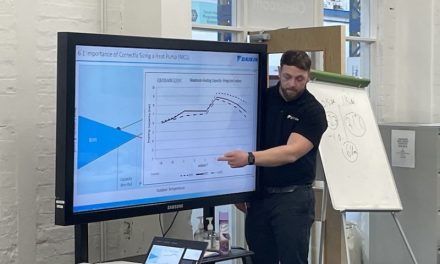If you are finding yourself struggling with a dry cough, tickly throat, dry eyes and mouth, or even a lack of sleep, then this may be because of the centralised heating system within your home.Whilst many of us would be quick to assume that these symptoms are due to stress, hay fever or even an allergy, it may be time for us all to look a little closer to home as to what exactly is causing these symptoms.
Here, Maria Bastian, managing director of renewable heating solutions provider Fischer Future Heat explains how and why heating can affect your health and your sleep, and how you can make a change to positively impact your health, home, and the environment.
How central heating can impact your health
Centralised heating systems do a fine job of heating up your home, but they do much more than that, and not in the way you may think.
If you are experiencing symptoms of sneezing, coughing, dry, itchy eyes, and sleepless nights, then your central heating may just be the problem. We are not saying it’s the entire cause, however, it most definitely contributes and will be playing a huge part in such symptoms.
As somebody who suffers with allergies, asthma, or other respiratory conditions, you may find yourself with more symptoms as the temperature begins to drop. This isn’t just coincidence.

Central heating is known for drying out and humidifying a room, which can often cause dehydration, leading to irritated eyes and dry mouths. With central heating systems the upstairs of your home which get hotter and more stuffy this hampers your sleep at night and central heating in particular is known for being noisy. Not only can central heating cause problems to your health, but it can keep you up at night, too.
Whilst fossil-fuelled heating systems don’t directly pollute our homes, they do negatively impact our outdoor environments. If they aren’t regularly serviced and faults are left undetected, gas boilers, cookers and open fires can also all cause, and contribute to, indoor pollution.
Changing tradition
Many of us wrongfully believe that centralised heating systems are good because traditionally, this is what is installed within our homes, in reality a heating system that regulates each room in the home is the future for efficiency, comfort and well being.
However, consumers are not adapting quickly, and this is due to the misinterpretations that electricity costs more than fossil fuels, including gas and oil.
There is one thing that keeps consumers from making the big switch from Gas to electric, and that is the cost. The difference between gas and electricity levies is having a direct impact on energy costs within the UK.
Until recently, 23% of the total cost of electricity is made up of levies, whereas for gas, it is just 2%. However, the government has announced plans to reverse the levy, moving to a ratio of 2.1:1 (electricity:gas), working towards a ratio of 1:1 by April 2025 in line with the Future Homes Standard.
Although electric is a much cleaner fuel, many consumers believe the secondary carbon footprint of electricity is still higher as it takes more energy to produce electricity, however this simply does not outweigh the pollution caused by fossil fuels. Also it more responsible for us as home owners to control the primary footprint, and by using Electricity for your heating you take a big step towards cleaning up your enivronment.
In 2019, almost a quarter of the UK’s greenhouse gas emissions were caused by energy supply, so with that in mind, we must ask ourselves what’s more important – saving a few pounds, or the planet?
However, do we actually save a few pounds? We all pay in our taxes to clean up the environment and improve our health. One of the biggest rises in health spending in cities is for respiratory illnesses, caused by pollution.
Improve your health at home
Electricity is a much cleaner source of fuel that does not negatively impact the environment, our health, or our homes.
Whilst there is no evidence to suggest that centralised heating systems cause respiratory conditions, it can be a hindrance to such. By switching to electric radiators, this can mitigate the risk of adding to pre-existing respiratory conditions, reducing the number of hospitalisations.
Innovative clay core radiators, powered by electricity, provide complete control, allowing a constant and warm airflow around each room, rather than causing the heat to rise, reducing the risk of dehydration and irritation.
Quiet and controlled room-by-room, electric radiators won’t interrupt sleep and can provide seasonal comfort. By introducing electric clay core radiators into our homes, we can wave goodbye to stuffy bedrooms and cold kitchens and live a life in comfortable temperatures.
As well as central heating, other traditional heating systems such as fires and back boilers are outdated, inefficient and are not only contributing to health conditions, but also global warming, too.
With the impending introduction of the Future Homes Standard making all new build homes future-proofed with low carbon heating systems, this is a step in the right direction to contribute to both the UK’s target of net zero carbon emissions by 2050, and to improve our health at home.
Why wait until 2025? Our health comes first, so let’s make that a priority and do what we can to remain in tip-top shape, starting by reassessing our home heating systems.




